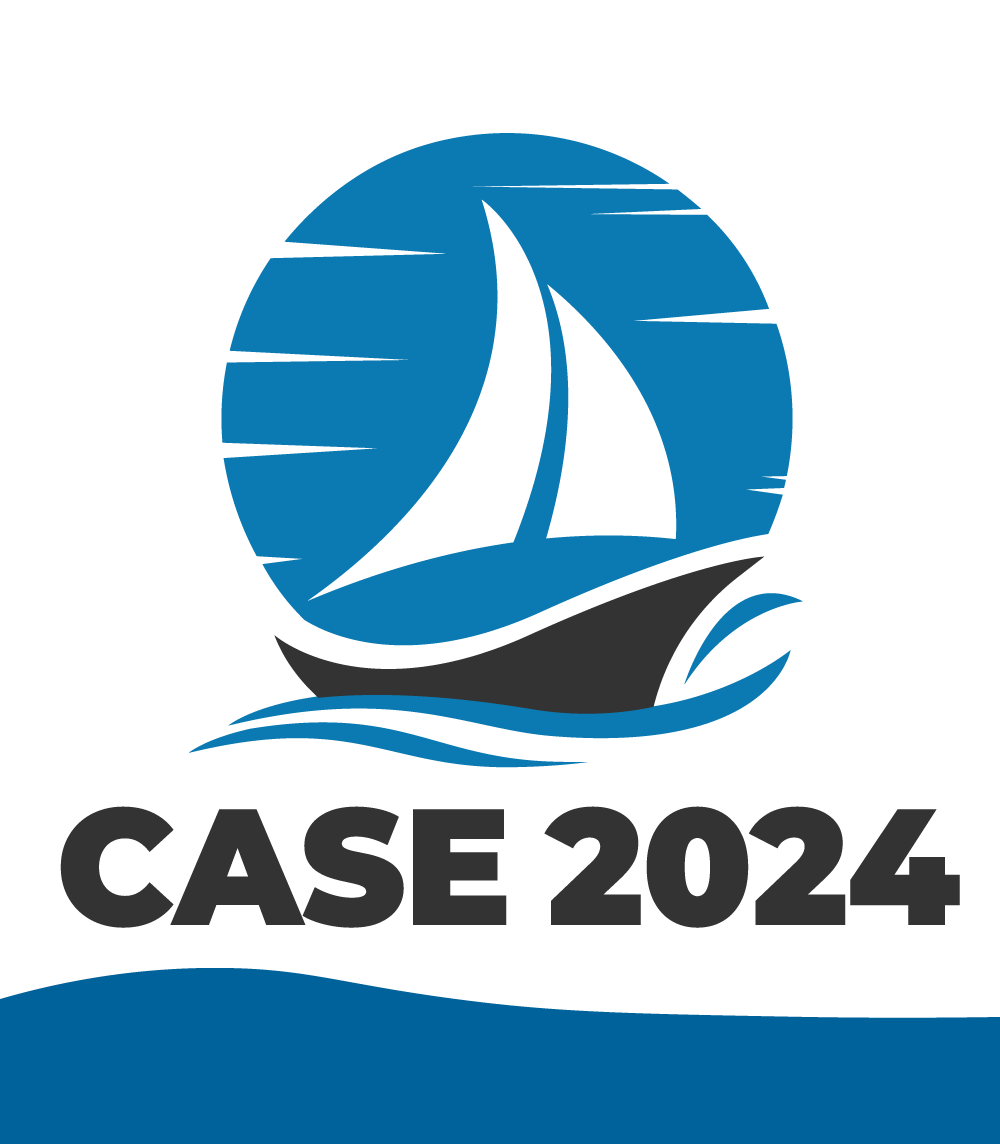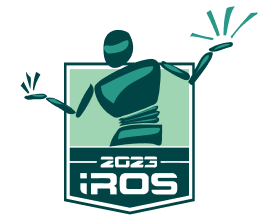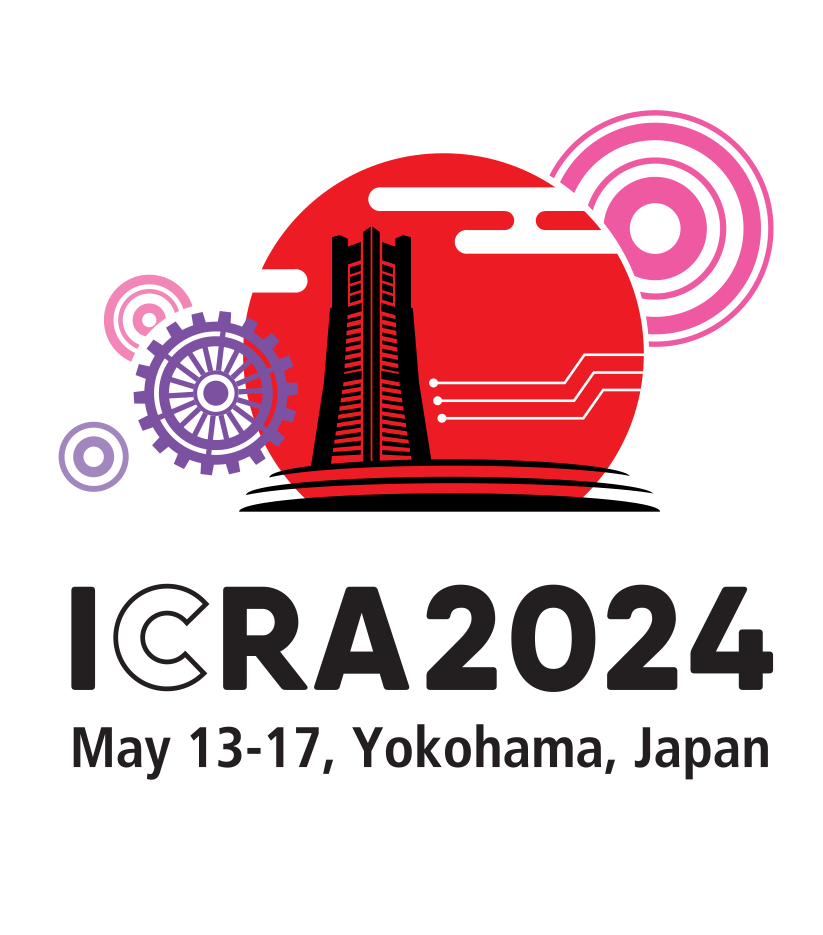Congratulations to the IDEA Grant Awardees at Humanoids 2023
On Thursday, 14 Dec 2023, the IEEE Robotics and Automation Society Women in Engineering Committee (WiE), officially presented IDEA grants to Blessing Egbeama, Diana Frias Franco, Hannah Claus, Pravina Samaratunga, Neasha Mittal, Tianyi Chen, Orestis Skoutellas, Lydia Melles, Rydia Weiland, Victoria Yang, Emmanuel Akinrintoyo, and Yusra Rasool. RAS congratulates the many worthy awardees for this round.
The IDEA grant allows early career students, cross-entry scholars, as well as re-entry scholars to participate in one of the major IEEE Robotics and Automation Society conferences. Awardees for this round were celebrated at the WiE lunch event at Humanoids 2023 in Austin, Texas, USA.
There will be subsequent calls for future opportunities in early 2024. Stay tuned and connect with RAS and WiE to receive updates on these and other activities.
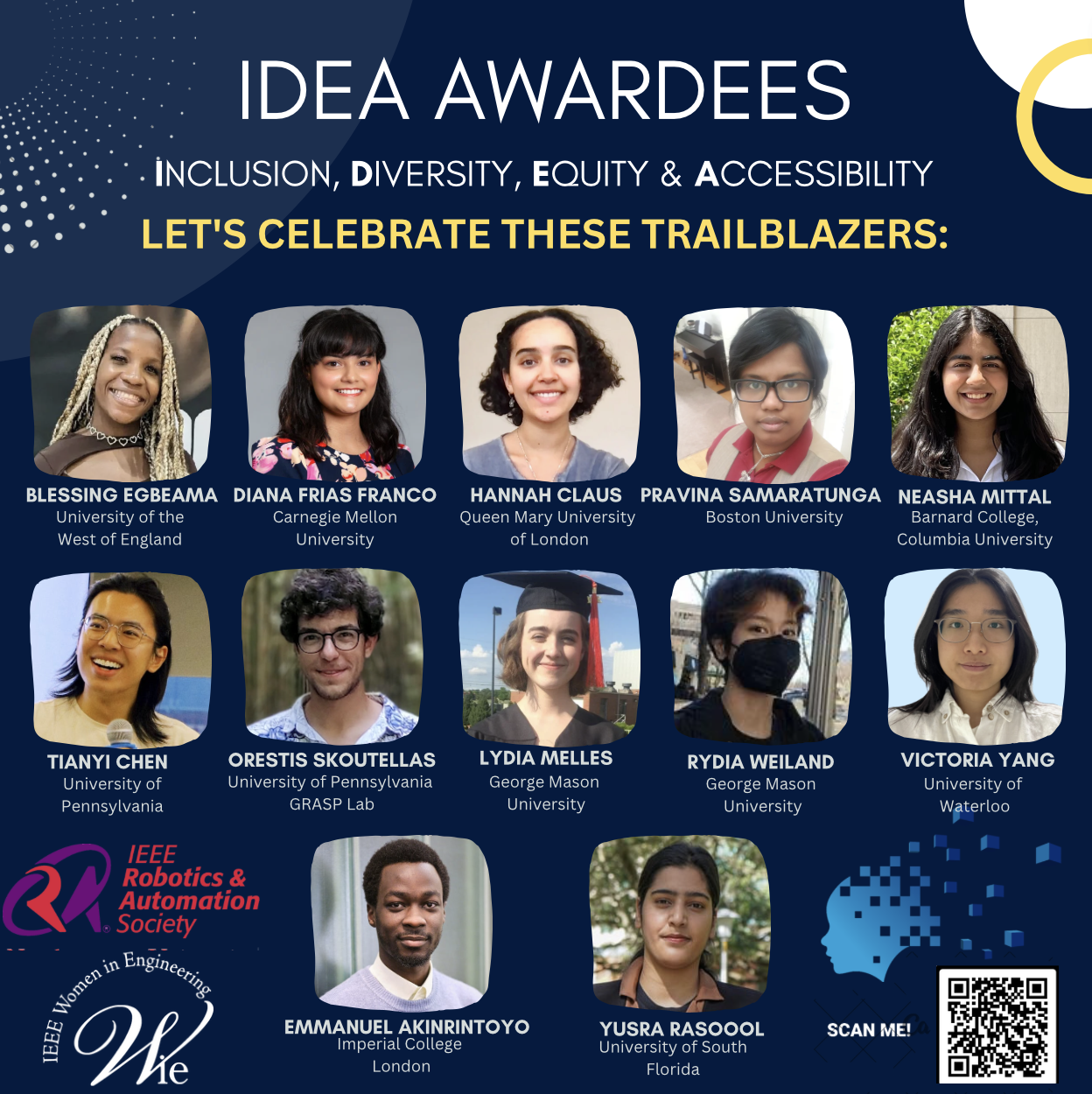
RAS WiE: Apply Now for IDEA Grants to Humanoids 2023 in Austin, TX, USA
The IEEE RAS Women in Engineering Committee (WiE) has launched a travel support program to encourage inclusion, diversity, equity, and accessibility (IDEA) in our community. The IDEA grants aim to make the major IEEE RAS conferences more accessible for underrepresented groups.
The RAS WiE is now accepting IDEA grant applications for the 2023 IEEE-RAS International Conference on Humanoid Robots (Humanoids), which will take place in Austin (TX), USA, on 12-14 December 2023. The Call for Applications is now open. Please note that the submission deadline is 20 October 2023 (11:59 PT).
Attend the WiE Luncheon at CASE 2023 on Diversity in Automation Science and Engineering
Join the IEEE-RAS Women in Engineering Committee (WiE) for a panel discussion and networking event at CASE 2023 in Auckland, NZ! The theme is Diversity in Automation Science and Engineering. The event will take place on Monday, 28 August 2023 from 12:15-13:30 in Gallery Room 4 at the Cordis Hotel in Auckland. Advance registration is required; more details, including a QR code for registration, can be found on the flyer.
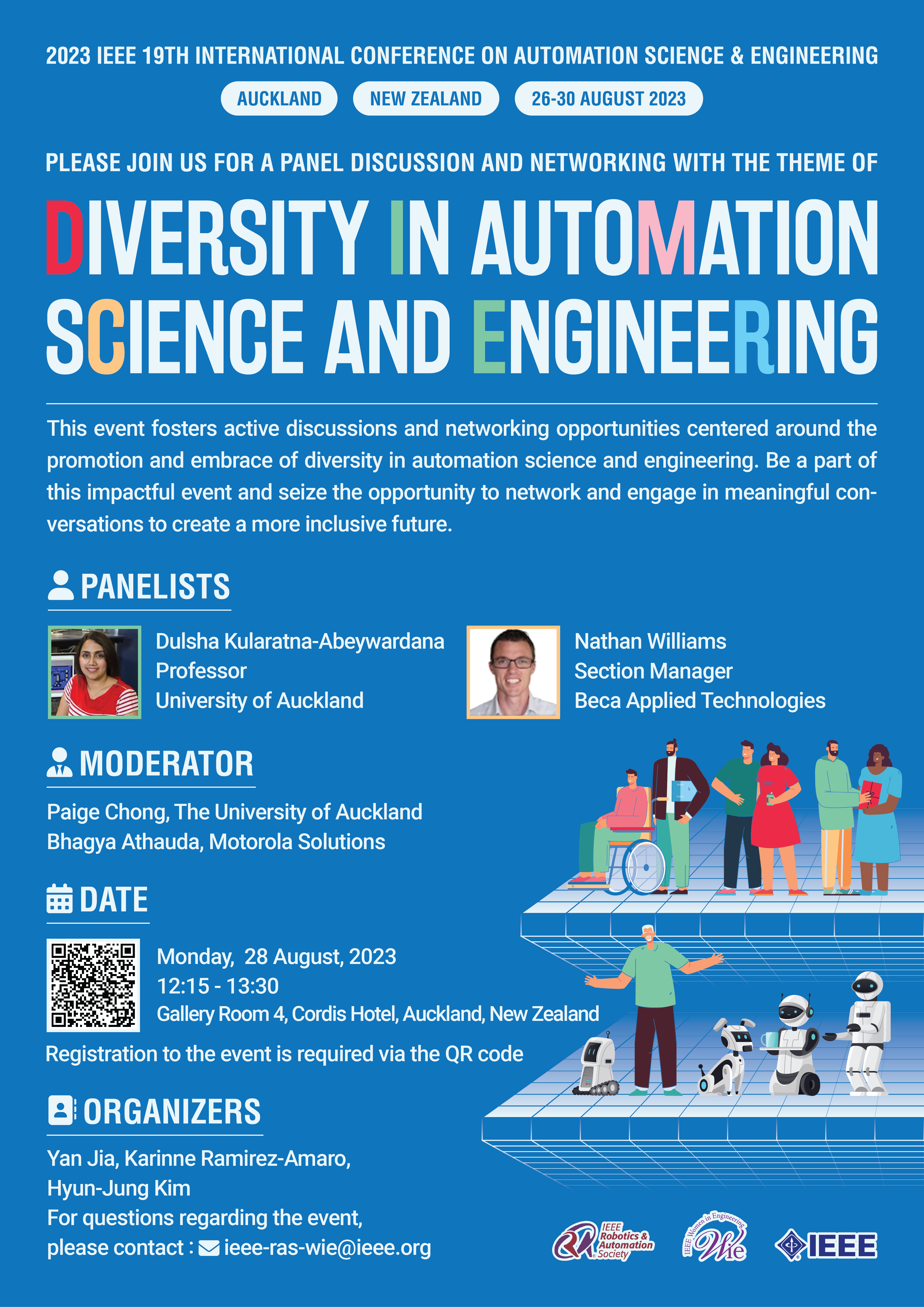
RAS WiE Panel at ICRA: The Role of Culture in Building Diverse Robotics Teams
Join the RAS Women in Engineering (WiE) Committee for an interactive panel discussion on 30 May 2023 at ICRA 2023 in London. The topic is: The Role of Culture in Building Diverse Robotics Teams. Check out the flyer below for more information. Please note that registration for this event is required; you can register here. If you have any questions, please reach out to ieee-ras-wie@ieee.org.

RAS WiE: Apply Now for IDEA Grants for CASE 2023 in New Zealand
The IEEE RAS Women in Engineering Committee (WiE) has launched a new travel support program to encourage inclusion, diversity, equity, and accessibility (IDEA) in our community. The IDEA grants aim to make the major IEEE RAS conferences more accessible for underrepresented groups.
The RAS WiE is now accepting IDEA grant applications for the IEEE International Conference on Automation Science and Engineering (CASE) 2023, to be held in Auckland, New Zealand from 26–30 August 2023. Each awardee will receive a maximum of $3,300 to cover the travel costs of the trip. Please note that awards will be distributed as travel reimbursements. The award will focus on supporting:
- Secondary/undergraduate/graduate students interested in robotics or automation topics
- Underrepresented groups
- People with disabilities
- People who have stepped down from the field for some time and want to return (e.g., due to illness or parental leave)
The Call for Applications is now open with the following schedule.
- Application submission deadline: 30 April 2023 (11:59 PT)
- Decisions: 21 May 2023
To apply for IDEA travel support, please follow the steps in the application form. The IDEA committee will select three applicants to attend CASE 2023.
RAS WiE: Announcing IDEA, a New Form of Travel Support
The IEEE RAS Women in Engineering Committee (WiE) wants to support the community and people interested in robotics and automation research by introducing a new travel support that encourages Inclusion, Diversity, Equity, and Accessibility (IDEA).
The main goal of IDEA is to further support our community by providing the opportunity to attend one of RAS’s major flagship conferences (e.g., ICRA, CASE, or IROS). This new IDEA travel support will focus on supporting:
- Secondary/undergrad/graduate students interested in robotics or automation topics
- Underrepresented groups
- People with disabilities
- People who have stepped down from the field for some time and want to return (e.g., due to illness or parental leave)
Our first call for applications will open on 27 January with the following schedule:
- Deadline to submit applications: 15 Feb 2023
- Decisions: 17 March 2023
To apply for IDEA travel support, please follow the steps in the Application Form.
The IDEA committee will select three applicants to attend the IEEE International Conference on Robotics and Automation (ICRA) in London from 29 May–2 June 2023.
Please read the full call for applications at this link:https://www.ieee-ras.org/women-in-engineering/wie-news.
RAS Member in the News Celebrates Women's History Month

IEEE Robotics and Automation Society Women in Engineering (RAS WIE) Chair Karinne Ramirez Amaro spoke at this year's Camp Vera. Camp Vera is a weekend packed with workshops and lectures from women in industry in Sweden -named after Sweden's first female engineer, Vera Sandberg. The project is focused on getting more people who identify as girls or non-binaries to be interested in technical subjects and increase awareness of the career opportunities that open up with an education in Automation and Mechatronics, Electrical Engineering, Computer Science, Information Technology and Medical Technology.
Additionally, Amaro was interviewed by El Financiero, discussing her important leadership positions within RAS. Amaro's thoughts on RAS WIE-“I have formed an excellent international work team. We also have more than 20 members of different nationalities, genders, ages and academic positions. The main objective of our committee is to create initiatives that help improve diversity in work teams. We are a new team and quite motivated by all the diversity challenges that we want to address in the coming years. On February 16, 2022 we had our first work meeting via Zoom. As a result we have planned different events, for example an event within the activities of ICRA in Philadelphia, USA in May. Another event at the CASE conference in Mexico in August 2022."
To read the full article CLICK HERE
Gender Diversity of Conference Leadership: A Sneak Preview to a study in the June 2021 Robotics and Automation Magazine
Friday, 4 June, 9:00 -10:00 am EDT (UTC-4 hours)
The IEEE RAS Women in Engineering (WIE) Committee recently completed a several year study of gender representation in conference leading roles at RAS-supported conferences. Individuals who hold these roles select organizing committees, choose speakers, and make final decisions on paper acceptances. The authors will lead a discussion about the findings and the story behind the study. In addition to presenting detailed data and releasing anonymized datasets for further study, the authors will provide suggestions on changes to help ensure a more diverse and representative robotics community where anyone can thrive.
Presented by:
- Laura Graesser, Robotics at Google, USA
Additional Discussion Led by:
- Lydia Tapia, University of New Mexico, USA
- Aleksandra Faust, Google Brain Research, US`A
- Hadas Kress-Gazit, Cornell University, USA
This event is open to all, but registration is required: https://ieee.webex.com/ieee/onstage/g.php?MTID=ebe6c38638a71e7dbaef1a461874ca1de
Attendees are encouraged to submit questions in advance using the following form:
https://app.smartsheet.com/b/form/deb6cf4afc134675adae10d109fe5255
IEEE RAS Women in Robotics Panel Discussion-Watch now!
Did you miss the IEEE RAS Women in Robotics Panel Discussion from 11 November 2020? -Watch it now!
1 December 2020 at 1:00 pm EST (18:00 GMT) via Webex.
Educators everywhere are reexamining and reinventing their teaching approach to meet the challenges of delivering a high-quality education in this unprecedented year. Many are revisiting established best practices while others are looking to new ways of reaching students. In robotics education, we are facing many difficult questions: How can we best engage students in robotics material in the current teaching environment? How can we overcome perceived limitations when teaching robotics content online, especially when hardware is involved? Where should robotics education research focus to address these issues head on?
To facilitate a conversation around these important questions, the IEEE Women in Engineering - Robotics and Automation Society (WIE-RAS) hosted an online panel on best practices for teaching robotics. The diverse panel boasts experts in robotics education from a variety of disciplines, institutions, and areas of expertise:
Carlotta Berry - Electrical and Computer Engineering, Rose-Hulman Institute of Technology, passionate about robotics education, increasing underrepresented populations in STEM, and enhanced human-robot interfaces
Katie Driggs-Campbell - Electrical and Computer Engineering, University of Illinois Urbana-Champaign, explores safe and interactive autonomous systems through modeling human behavior, designing robust decision and control frameworks, and developing multi-agent validation schemes
Cecilia Laschi - Mechanical Engineering at the National University of Singapore, interests are in biorobotics, soft robotics, humanoid robotics and neurorobotics.
Iolanda Leite - Division of Robotics, Perception and Learning, KTH Royal Institute of Technology, develops social robots that can capture, learn from, and respond appropriately to the subtle dynamics of real-world situations
Karinne Ramirez-Amaro - Electrical Engineering, Chalmers University of Technology, advances artificial intelligence and robotics research in semantic representations, decision making, and human activity recognition and understanding
Panelists have taught a variety of undergraduate and graduate courses ranging from introductory robotics and applied programming to project-based design courses to specialized courses on human-centered robotics, autonomous decision-making, human perception for information technology, and intelligent robotics to name a few.
Panelists share their experience in best practices for robotics education, provide strategies for applying these practices to new courses, discuss major challenges in online robotics education and how they have overcome them, and talk about where they see robotics education headed.
IEEE RAS Women in Robotics Panel Discussion
|
|
Women in Robotics Panel
 Carlotta Berry
Rose-Hulman Institute
of Technology, USA |
Katie Driggs-Campbell
University of Illinois
Urbana-Champaign, USA |
Cecilia Laschi
National University of Singapore
Singapore |
|
Iolanda Leite
KTH Royal Institute
of Technology, SWEDEN |
Shawna Thomas
Moderator
Texas A&M University,USA
|
Karinne Ramirez-Amaro
Chalmers University of
Technology, SWEDEN |










